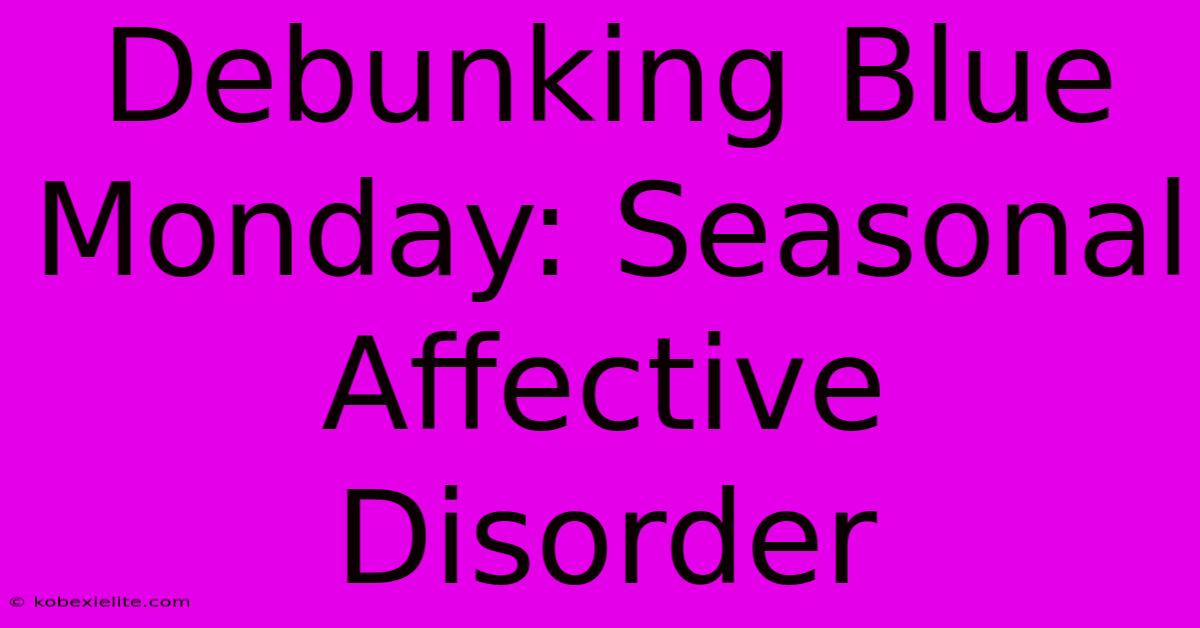Debunking Blue Monday: Seasonal Affective Disorder

Discover more detailed and exciting information on our website. Click the link below to start your adventure: Visit Best Website mr.cleine.com. Don't miss out!
Table of Contents
Debunking Blue Monday: Understanding Seasonal Affective Disorder (SAD)
"Blue Monday," that purportedly saddest day of the year, is a largely debunked marketing gimmick. While January can be tough for many, attributing widespread sadness to a single day ignores the complex reality of seasonal affective disorder (SAD) and other mental health challenges. This article dives deeper into SAD, separating fact from fiction and offering insights into coping strategies.
What is Seasonal Affective Disorder (SAD)?
Seasonal Affective Disorder, also known as winter depression, is a type of depression that typically occurs during the late fall and winter months. Unlike typical depression, SAD's onset and remission are closely tied to changes in seasons and sunlight exposure. Reduced sunlight leads to disruptions in the body's natural circadian rhythm and a decrease in serotonin and melatonin production – crucial neurotransmitters impacting mood regulation.
Symptoms of SAD:
Symptoms of SAD can vary but often include:
- Persistent low mood: A feeling of sadness, hopelessness, and despair that lasts for an extended period.
- Loss of interest or pleasure: Apathy towards activities once enjoyed.
- Changes in sleep patterns: Oversleeping or insomnia.
- Changes in appetite: Increased carbohydrate cravings and weight gain are common.
- Low energy levels: Fatigue and lack of motivation.
- Difficulty concentrating: Problems focusing and making decisions.
- Social withdrawal: Avoiding social interactions.
- Feelings of worthlessness or guilt.
It's crucial to remember that experiencing some of these symptoms doesn't automatically mean you have SAD. However, if several symptoms are present and significantly impact your daily life for several weeks, consulting a healthcare professional is essential.
Separating Fact from Fiction: The "Blue Monday" Myth
The concept of "Blue Monday" lacks scientific basis. It's a formula created by a travel company, and its purported calculations are largely arbitrary and unsupported by research. While January might see a dip in overall mood for some, this is likely related to factors beyond a single date, including:
- Post-holiday blues: The letdown after the festive season can contribute to decreased mood.
- Weather: Darker, colder days can impact mood and energy levels.
- Financial pressures: January often brings financial strain after holiday spending.
Instead of focusing on the manufactured "Blue Monday," it's more beneficial to acknowledge the legitimate mental health challenges people face, especially during the winter months.
Coping with SAD and Winter Blues
Managing SAD and winter blues effectively involves a multi-faceted approach:
Light Therapy:
Light therapy boxes simulate natural sunlight and can be highly effective in alleviating SAD symptoms. Consulting a doctor before using light therapy is advisable.
Regular Exercise:
Physical activity releases endorphins, which have mood-boosting effects. Even short walks in daylight can be beneficial.
Healthy Diet:
Nourishing your body with a balanced diet can contribute to overall well-being and improve mood.
Cognitive Behavioral Therapy (CBT):
CBT can help identify and challenge negative thought patterns and develop coping mechanisms for managing difficult emotions.
Medication:
In some cases, medication may be necessary to manage SAD symptoms. A doctor can assess your needs and recommend appropriate treatment.
Social Connection:
Maintaining social connections and engaging in enjoyable activities are crucial for emotional well-being.
When to Seek Professional Help
If you are experiencing persistent low mood, significant changes in behavior, or difficulty managing daily tasks, seeking professional help is crucial. A doctor or mental health professional can provide a proper diagnosis and recommend appropriate treatment options. Don't hesitate to reach out for support; you're not alone.
Remember: SAD is a treatable condition. With the right support and strategies, you can navigate the challenges of winter and maintain your mental well-being. Prioritize self-care and seek help when needed. This is far more effective than worrying about a fabricated "Blue Monday."

Thank you for visiting our website wich cover about Debunking Blue Monday: Seasonal Affective Disorder. We hope the information provided has been useful to you. Feel free to contact us if you have any questions or need further assistance. See you next time and dont miss to bookmark.
Featured Posts
-
College Football Bound Mc Guire And Rendell
Jan 21, 2025
-
Bears New Coach Ben Johnson
Jan 21, 2025
-
Manchester Uniteds New Hope Dorgu
Jan 21, 2025
-
2025 Holiday Closures Mlk And Inauguration Day
Jan 21, 2025
-
Bears Hire Lions Oc Ben Johnson
Jan 21, 2025
